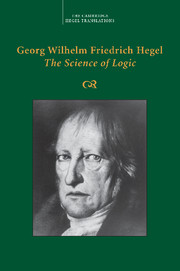Book One - The Doctrine of Being
Published online by Cambridge University Press: 30 September 2021
Summary
WITH WHAT MUST THE BEGINNING OF SCIENCE BE MADE?
It is only in recent times that there has been a new awareness of the difficulty of finding a beginning in philosophy, and the reason for this difficulty, and so also the possibility of resolving it, have been discussed in a variety of ways. The beginning of philosophy must be either something mediated or something immediate, and it is easy to show that it can be neither the one nor the other; so either way of beginning runs into contradiction.
The principle of a philosophy also expresses a beginning, of course, but not so much a subjective as an objective one, the beginning of all things. The principle is a somehow determinate content – “water,” “the one,” “nous,” “idea,” or “substance,” “monad,” etc. – or, if it designates the nature of cognition and is therefore meant simply as a criterion rather than an objective determination, as “thinking,” “intuition,” “sensation,” “I,” even “subjectivity,” then here too the interest still lies in the content determination. The beginning as such, on the other hand, as something subjective in the sense that it is an accidental way of introducing the exposition, is left unconsidered, a matter of indifference, and consequently also the need to ask with what a beginning should be made remains of no importance in face of the need for the principle in which alone the interest of the fact seems to lie, the interest as to what is the truth, the absolute ground of everything.
But the modern perplexity about a beginning proceeds from a further need which escapes those who are either busy demonstrating their principle dogmatically or skeptically looking for a subjective criterion against dogmatic philosophizing, and is outright denied by those who begin, like a shot from a pistol, from their inner revelation, from faith, intellectual intuition, etc. and who would be exempt from method and logic. If earlier abstract thought is at first interested only in the principle as content, but is driven as philosophical culture advances to the other side to pay attention to the conduct of the cognitive process, then the subjective activity has also been grasped as an essential moment of objective truth, and with this there comes the need to unite the method with the content, the form with the principle.
- Type
- Chapter
- Information
- Georg Wilhelm Friedrich Hegel: The Science of Logic , pp. 45 - 57Publisher: Cambridge University PressPrint publication year: 2010

